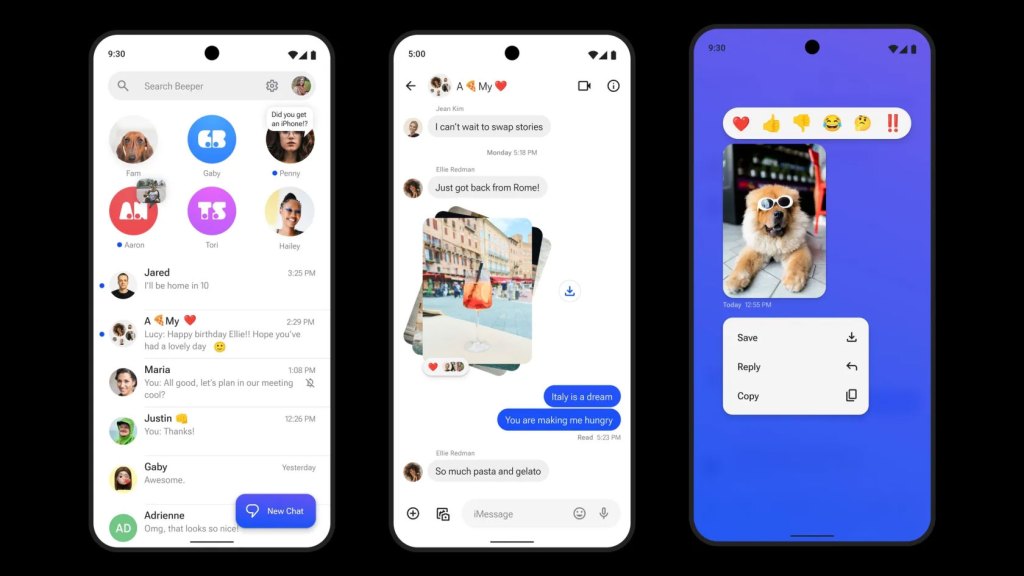DOJ calls out Apple for breaking iMessage-on-Android solution, Beeper

The U.S. Department of Justice’s lawsuit against Apple filed on Thursday cites the iPhone maker’s battle against Beeper, the app that aimed to bring iMessage to Android users. Beeper gave up on its mission after Apple blocked the app’s efforts late last year. The DOJ referenced the dispute in its lawsuit as an example of Apple controlling “the behavior and innovation of third parties in order to insulate itself from competition.”
Beeper, a startup from Pebble smartwatch founder Eric Migicovsky, managed to reverse-engineer the iMessage protocol to bring support for end-to-end encrypted blue bubble iMessage chats to Android users. Beeper functioned as a true iMessage client, supporting threads, replies, read receipts, direct messages and group chats, tapback emoji reactions, editing and more.
As soon as Beeper launched, the companies entered into a game of cat-and-mouse, which Apple ultimately won. Each time Beeper issued workarounds and fixes to keep the service afloat, Apple knocked them down one by one. The dispute led to a bipartisan group of U.S. lawmakers asking the DOJ to investigate Apple’s anticompetitive treatment of the app.
“Recently, Apple blocked a third-party developer from fixing the broken cross-platform messaging experience in Apple Messages and providing end-to-end encryption for messages between Apple Messages and Android users,” the DOJ complaint reads. “By rejecting solutions that would allow for cross-platform encryption, Apple continues to make iPhone users’ less secure than they could otherwise be.”
Apple sued by DOJ over iPhone monopoly claims
At the time of the dispute, Apple argued that Beeper “posed significant risks to user security and privacy, including the potential for metadata exposure and enabling unwanted messages, spam, and phishing attacks.”
The battle between the two companies has also caught the eye of FCC commissioner Brendan Carr, who in February asked the agency to investigate Apple’s actions through the lens of the FCC’s Part 14 rules on accessibility, usability and compatibility.
The DOJ cited the battle between the two companies as part of a broader argument accusing Apple of protecting its smartphone monopoly to undermine cross-platform messaging apps and rival smartphones. The department argues that Apple is “knowingly and deliberately degrading quality, privacy, and security for its users.”
The lawsuit also accuses Apple of suppressing smartwatch cross-platform compatibility, which is something that Migicovsky previously dealt with at Pebble, a smartwatch company that shut down in 2016. The DOJ notes that in 2013, Apple started offering users the ability to connect their iPhones with third-party smartwatches and gave third-party smartwatch developers access to various APIs related to the Apple Notification Center Service, Calendar, Contacts and geolocation. When Apple launched the Apple Watch the following year, it began limiting third-party access to new and improved APIs for smartwatch functionality.
The DOJ notes that Apple prevents iPhone users from responding to notifications using a third-party smartwatch. The department says that Apple instead provides third-party smartwatches access to more limited APIs that don’t allow users to do things that are available on its own Apple Watch, such as responding to a message or accepting a calendar invite.
The lawsuit goes as far as accusing Apple of having “copied the idea of a smartwatch from third-party developers.”
For more on Apple’s antitrust lawsuit, check here:
Apple sued by DOJ over iPhone monopoly claimsDOJ claims green bubbles are an issue in Apple iPhone antitrust lawsuitWhy Apple’s antitrust lawsuit could be a silver lining for Epic GamesApple’s iPhone is not a monopoly like Windows was a monopoly Epic, Spotify, Deezer, Match Group and others applaud DOJ’s Apple lawsuit


